2023-2024 Courses
Spring 2024
Graduate Courses
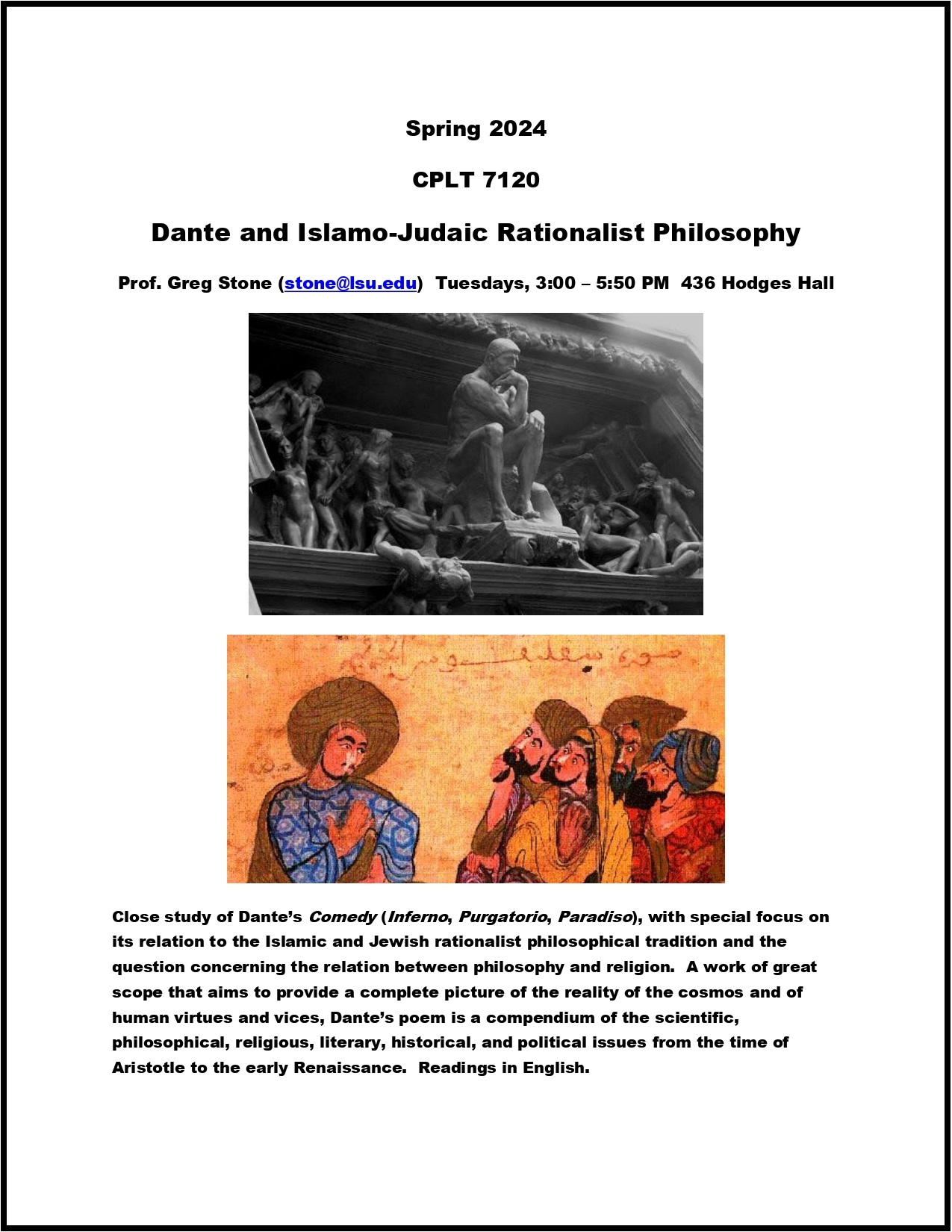 CPLT 7120: Dante and Islamo-Judaic Rationalist Philosophy
CPLT 7120: Dante and Islamo-Judaic Rationalist Philosophy
Instructor: Greg Stone
Time: T 3:00-5:50 p.m.
Close study of Dante’s Comedy (Inferno, Purgatorio, Paradiso), with special focus on its relation to the Islamic and Jewish rationalist philosophical tradition and the question concerning the relation between philosophy and religion. A work of great scope that aims to provide a complete picture of the reality of the cosmos and of human virtues and vices, Dante’s poem is a compendium of the scientific, philosophical, religious, literary, historical, and political issues from the time of Aristotle to the early Renaissance. Readings in English.
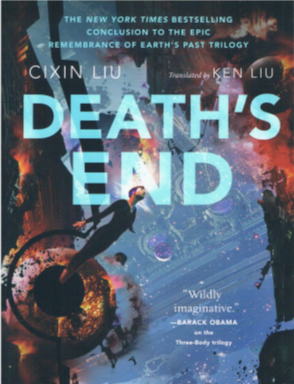
CPLT 7130 Science Fiction East and West
Instructor: Qiancheng Li
Time: Th 3:00:5:50 p.m.
Isaac Asimov. Arthur C. Clarke. Liu Cixin…. This course studies Science Fiction as a truly global genre. The works to be considered—among them, The Three-Body Problem trilogy, a.k.a. Remembrance of Earth’s Past, which Former President Obama characterized as “wildly imaginative”—are of epic and encyclopedic dimensions and proportions, bridging histories of the past and the future and bringing together multiple branches of science and other disciplines, as far as our imagination can handle and absorb. They ask and try to answer big questions, like the nature of the cosmos and the future of humanity. Reductively, this course may be titled science fiction and/as philosophy/religion. Among the topics to be explored are the evolution of the genre, its manifestations along cultural lines, humanity and technology, representations of the human condition in literary forms, their adaptations in film, and their continuations as prequels and sequels. We will read selected theoretical works as well as a number of masterpieces and short stories. Students are expected to lead discussions on a topic of their choice, and complete a 20-page term paper or a project of creative nature. All readings in English. Of interest to students of literature and creative writing.
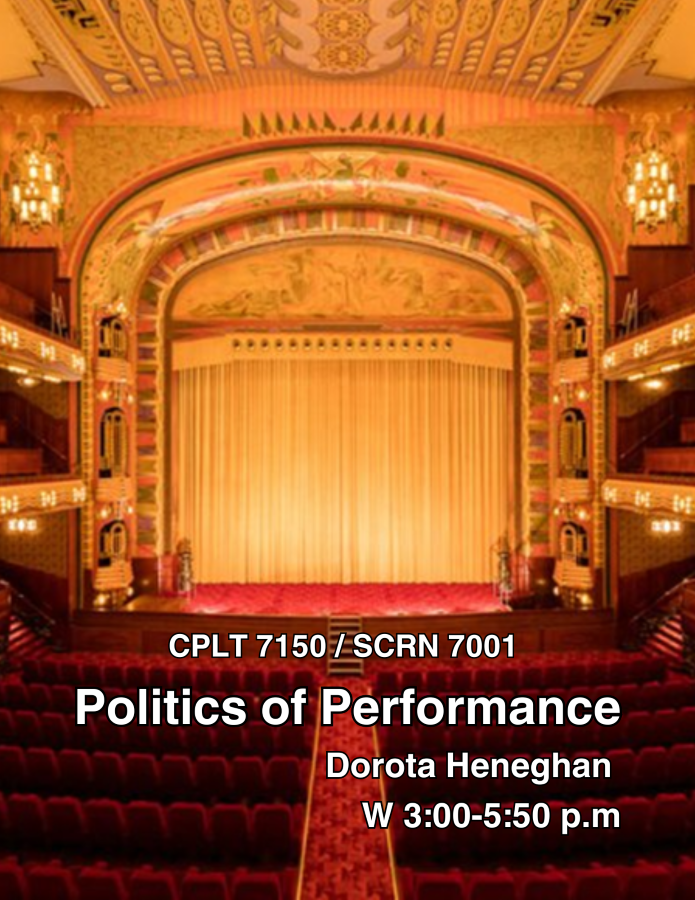 CPLT 7150 / SCNR 7001: Politics of Performance
CPLT 7150 / SCNR 7001: Politics of Performance
Instructor: Dorota Heneghan
Time: W 3:00-5:50 p.m.
This course explores the political relevance of performance in a wide range of films and literary works in particular national contexts and across the globe. Concentrating on the political influence on cinema and the many ways literary texts and cinematic adaptations represent and construct ideologies of gender, nation, and empire, we will examine the connections between art and activism, performance and political power, aesthetics of performance and politics. Authors and filmmakers to be discussed include Javier Cercas, Manuel Rivas, Arturo Pérez-Reverte, Heinrich Mann, Klaus Mann, Ferdinand Bordewijk, Anton Chekhov, José Luis Cuerda, David Trueba, Pedro Olea, István Szabó, Michael Mayer, Josef von Sternberg, Mike van Diem and others. All texts will be read in translation. All films will be subtitled in English.
Undergraduate Courses
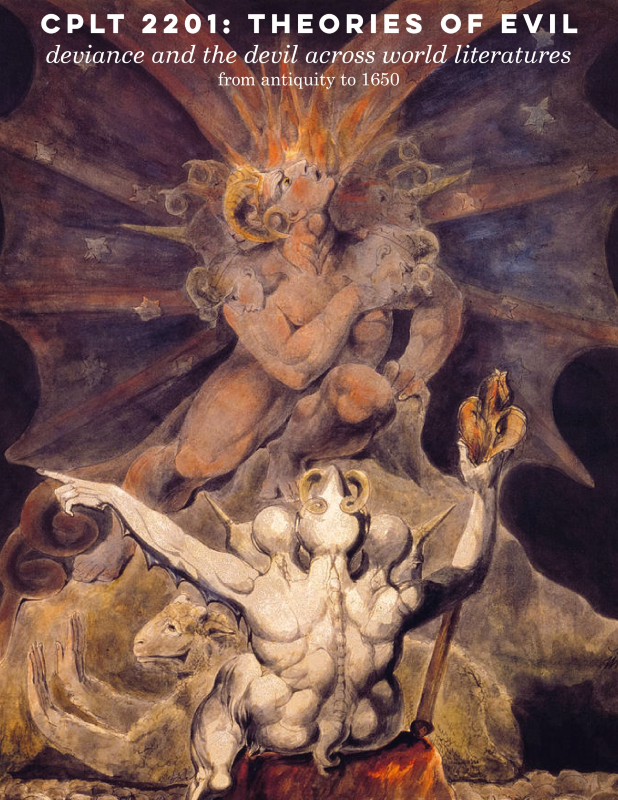 CPLT 2201 / ENGL 2201 (Section 1): Theories of Evil: Deviance and the Devil across
World Literatures
CPLT 2201 / ENGL 2201 (Section 1): Theories of Evil: Deviance and the Devil across
World Literatures
Instructor: Gabrielle Bologna
Time: MWF 11:30-12:20 p.m.
The battle between good and evil is ever-present, even in the world’s oldest stories. Understanding this theme in literature first requires a definition of evil, and this course is devoted to how such definitions are represented by the early voices of world literature. With special attention to Western Europe and the rise of Christianity, we will read and discuss works from Greek mythology to masterpieces of the Renaissance. In reading depictions of evil, devils and deviances, our focus will turn toward a broader discourse surrounding storytelling and its relationship to the changing nature of values and ethics across time and cultures. While we question how portrayals of evil shape and challenge our views of both world literature (and history itself), we will work to sharpen our skills in critical reading, academic writing, contextualization, and multimodal communication.
Required texts:
The Penguin Book of Hell (Penguin Classics, 2018)
by Scott G. Bruce.
Inferno (Longfellow translation, 2021 ed.)
by Dante Alighieri (Author), Henry Wadsworth Longfellow (Translator).
"Doctor Faustus" (Norton Critical Editions, 2005)
by Christopher Marlowe (Author), David Scott Kastan (Editor).
Paradise Lost (with an Introduction by M. Macmillan, 2016 ed.)
by John Milton (Author), M. Macmillan.
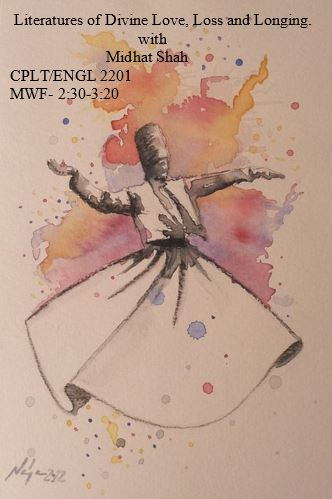 CPLT 2201 / ENGL 2201 (Section 2): Literatures of Divine Love, Loss and Longing.
CPLT 2201 / ENGL 2201 (Section 2): Literatures of Divine Love, Loss and Longing.
Instructor: Midhat Shah
Time: MWF 2:30-3:20 p.m.
Divine love or عشق is a motif that has influenced writers throughout the ages, from every culture to every tradition, since the dawn of time. Themes of passion, devotion, displacement, separation, and self-discovery, along with spiritual quests, and immortality have blossomed into texts of unsurpassed depth and complexity. Whether it is an ancient heroic and romantic epic or didactic poetry, these writers have entertained, sustained and comforted audiences and readers through their aural, visual or textual reception of their works.
This module will examine a range of genres and forms, and will aim to provide students with insight into motif and interpretation of divine love, loss, and longing by looking at a specific selection of texts in English translation (in poetry ) by different authors from across the regions of Africa, the Middle East, South and Southeast Asia and Europe, from Antiquity to Renaissance. This course will take us through the works of a variety of writers, ranging from Mister Eckhart to Maulana Rumi to Hadewijch to Mira to Lalla Dyad, interpreting and critically analyzing a wide range of texts and engaging with a variety of critical approaches when we read specific texts in their cultural, intercultural, and historical contexts.
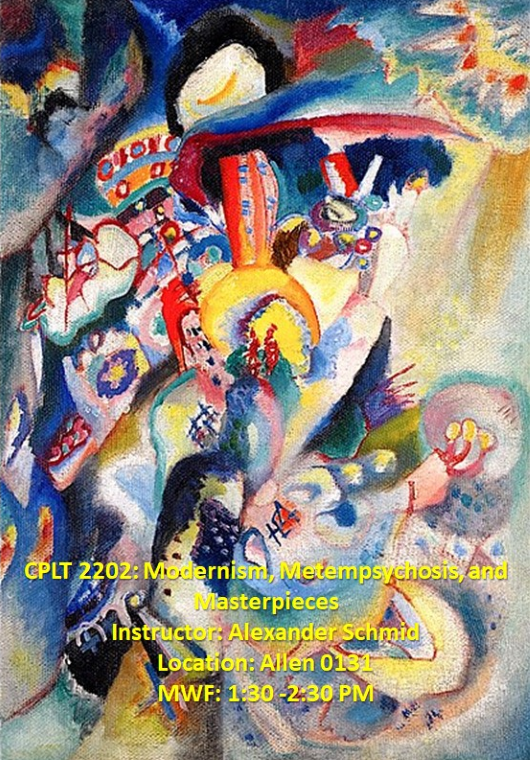
CPLT 2202 / ENGL 2202 (Section 1): Modernism, Metempsychosis, and Masterpieces
Instructor: Alexander Schmid
Time: MWF 1:30-2:20 p.m.
Join me this Spring on an adventure that will span time and space.
Modernism is sometimes described as an art movement which eschews classical forms and techniques. But what does it mean for a text to be modern? Need it have been recently written, focus on certain themes, or be expressed in a certain genre? A masterpiece is defined by Harvard professor David Damrosch as a work of near classical value which is itself a literary analogy of a liberal democracy, but what does it really mean for a text to be a masterpiece? Does this term suggest a rank beyond the normal measure? Does it suggest a workmanship not witnessed in the average piece of art? Can a masterpiece also be a classic and piece of world literature? Or does it suggest something as banal as mere popularity? Join me on an adventure from the 17th century through the 20th century to inquire into these questions.
Required Texts:
1. Cervantes, Miguel de. Don Quixote. Trans. Edith Grossman, Ecco; Reprint edition, 2005. ISBN: 978-0060934347.
2. Goethe, Wolfgang von. Faust: A Tragedy. Trans. Walter W. Arndt., Ed. Cyrus Hamlin, W. W. Norton & Company; 2nd Ed. 1998. ISBN: 978-0393972825.
3. Dostoevsky, Fyodor. Notes from the Underground. Ed. Michael R. Katz, W. W. Norton & Company; 2nd ed., 2000. ISBN: 978-0415045407.
4. Joyce, James. Ulysses. Vintage, first ed., 1986. ISBN: 978-0394743127.
5. Mann, Thomas. The Magic Mountain. Trans. John E. Woods, Vintage, 1996. ISBN: 978-0679772873.
6. Woolf, Virginia. Mrs. Dalloway. Vintage, 1st Edition, 2016. ISBN: 978-1784870867.
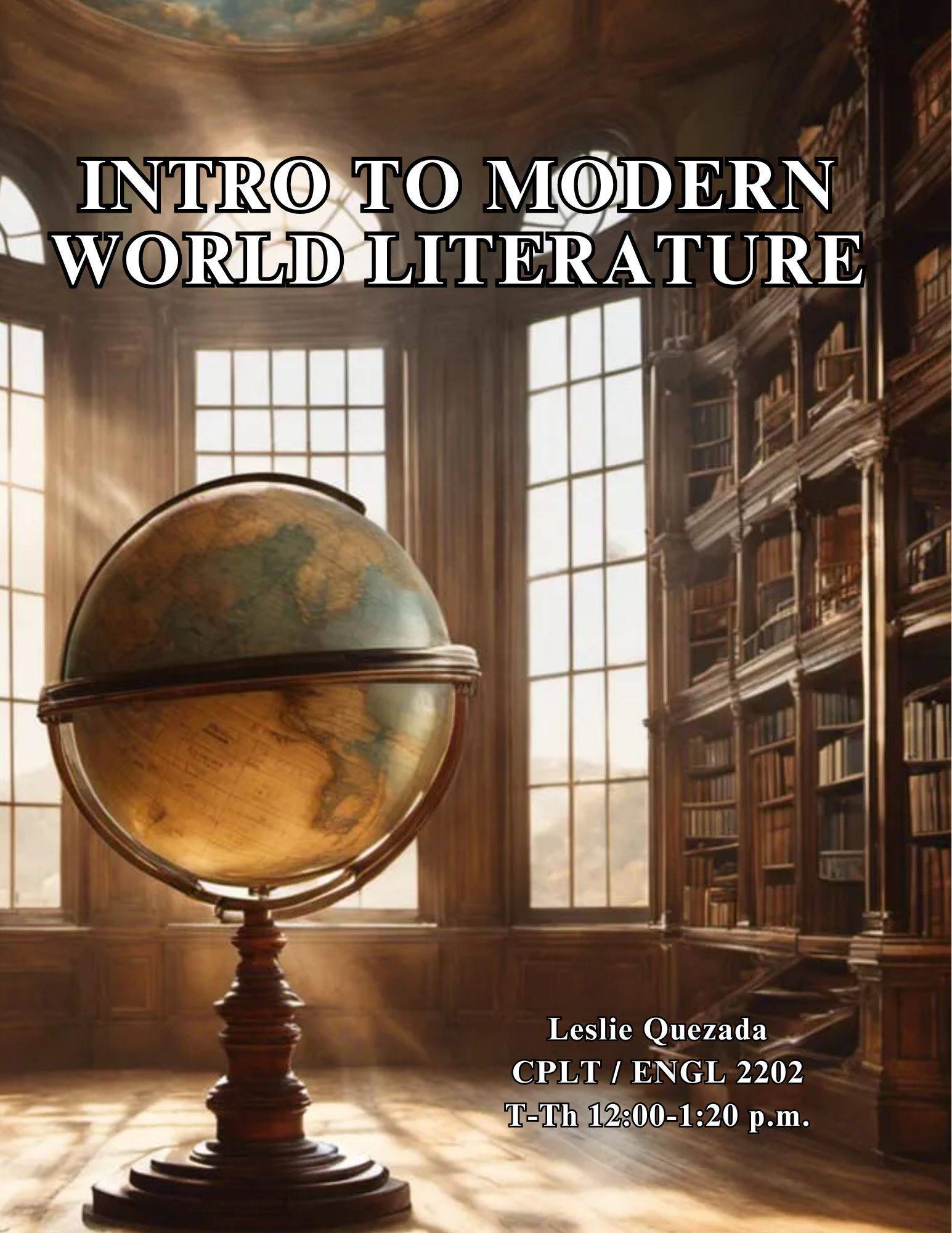 CPLT 2202 / ENGL 2202 (Section 2): Introduction to Modern World Literature
CPLT 2202 / ENGL 2202 (Section 2): Introduction to Modern World Literature
Instructor: Leslie Quezada
Time: T-Th 12-1:20 p.m.
This course focuses on representative works of modern and contemporary world literature by authors such as Chikamatsu Monzaemon, Henrik Ibsen, Sor Juana Ines de la Cruz, Frederick Douglass, and Wole Soyinka. From Journey to the West to The Metamorphosis, we will investigate representations of identity and culture, which will help guide our reading and analysis. We will begin our journey in the 14th century with early modern East Asian literature, traveling through places and time, ending with 21st century contemporary literature. The goal of this course is to introduce students to cultural diversity in a variety of literary traditions and genres, including novels, short-stories, film, poetry, and semi-autobiographical fiction. This course will also introduce foundational concepts and theories of world literature as an exciting field of study.
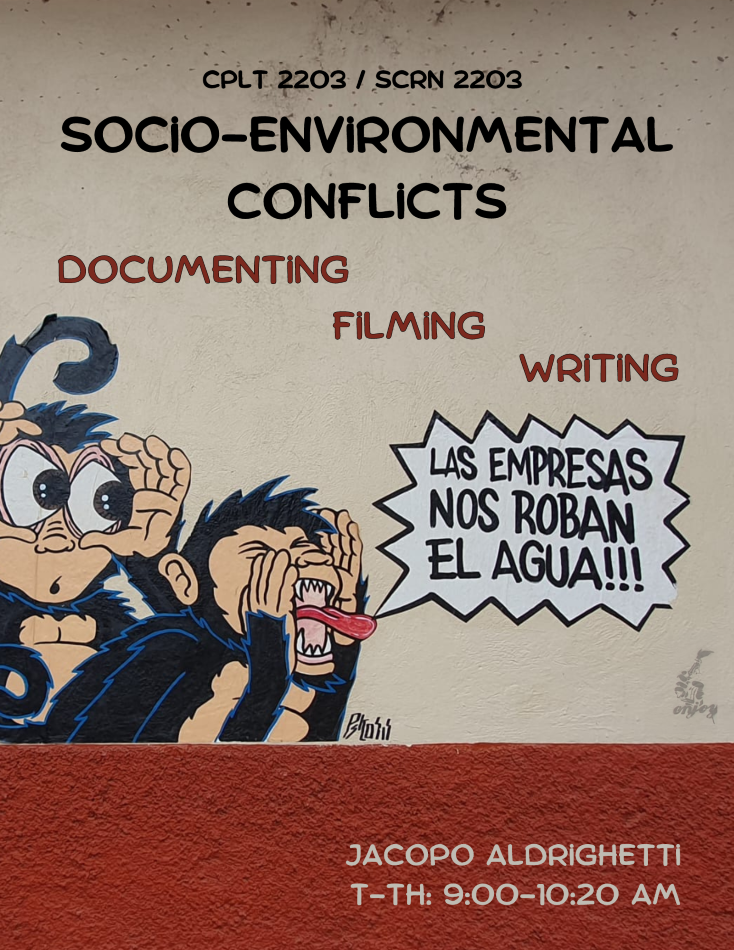
CPLT 2203 / SCRN 2203: Socio-environmental Conflicts: Documenting, Filming, Writing
Instructor: Jacopo Aldrighetti
Time: T-Th 9:00-10:20 a.m.
What are socio-environmental conflicts? How are they documented, portrayed, and discussed in diverse media? In the age of global extractivism and environmental degradation, conservationists and environmentalists have strived to promote nature conservation while denouncing or attempting to mitigate the displacement of local or indigenous populations worldwide. This course delves into the documentation of socio-environmental conflicts globally, examining their socio-economic origins and their impact on local communities and their environments. By investigating case studies from several continents through the analysis of ethnographic films and relevant environmental literature (including non-fiction, fiction, and poetry), the course will explore human-environment interactions from multifaceted perspectives to identify historical patterns, conservation strategies, and movements of local socio-ecological resilience.
Required readings and films will be made available through Moodle.
For further information about the course, you are welcome to contact me at [email protected].
Fall 2023
Graduate Courses
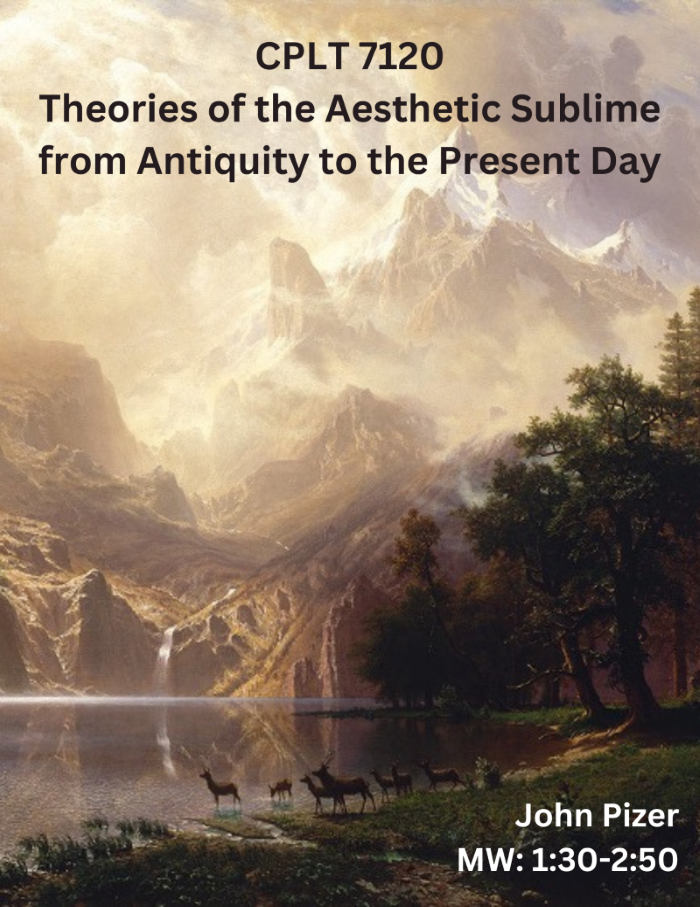
CPLT 7120: Theories of the Aesthetic Sublime from Antiquity to the Present Day
Instructor: John Pizer
Time: MW 1:30-2:50 p.m.
Common to almost all definitions of the aesthetic sublime is that it refers to a feeling of awe and veneration triggered by a work of art. However, what brings about this sentiment has been the subject of widely divergent arguments. Longinus was the most famous figure from Antiquity to deal with this issue. He argued that the sublime was a feeling evoked by outstanding writing or discourse which makes careful use of rhetoric. Kant believed that the awe inspired by the sublime is rooted in a feeling of terror, but a terror experienced in quiet contemplation. Burke believed that a sublime work of art must be rooted in obscured perception, as in a painting where exalted natural objects are portrayed from a great distance or at least somewhat shrouded. More recent work focuses on the phenomenology and psychology of sublime sentiment. Our class will examine theories of the sublime from Antiquity to the present day and on multiple continents. The grade will be based on the conducting of one class by each student and a term research paper of some 20 pages. The two required texts are an anthology of writing on the sublime and a work which provides a broad historical overview of this subject.
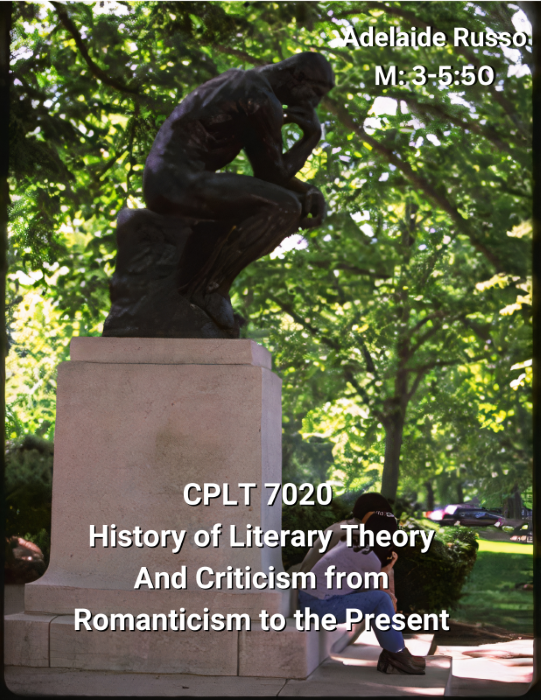
CPLT 7020: History of Literary Theory and Criticism from Romanticism to the Present
Instructor: Adelaide Russo
Time: M 3:00-5:50 p.m.
Course Objectives: 1) To study the history of Western Literary Criticism and Theory from the late Nineteenth Century to the Present, considering the changes in literary thought resulting from an increasingly global cultural perspective; 2) To develop students’ research and writing skills and help them understand the conventions and requirements of academic discourse on literature: 3) To facilitate students’ cultivation of their talents as creative readers and writers.
Topics Addressed in Modern and Contemporary Schools and Movements: The Canon; Formalism; Structuralism, Poetry; Narrative Theory; Media, Culture and Post-Modernism; Deconstruction and Post-Structuralism; Feminism, Gender Studies and Queer Theory; Marxism, New Historicism and Literary History; Phenomenology, Hermeneutics, and Reader-Response Theory; Postcolonial Theory and Criticism; Race and Ethnicity; Psychoanalysis and its Critics; Ideology and Hegemony; Anthropological Approaches to Literature; Popular Culture; Media Studies; Digital Humanities.
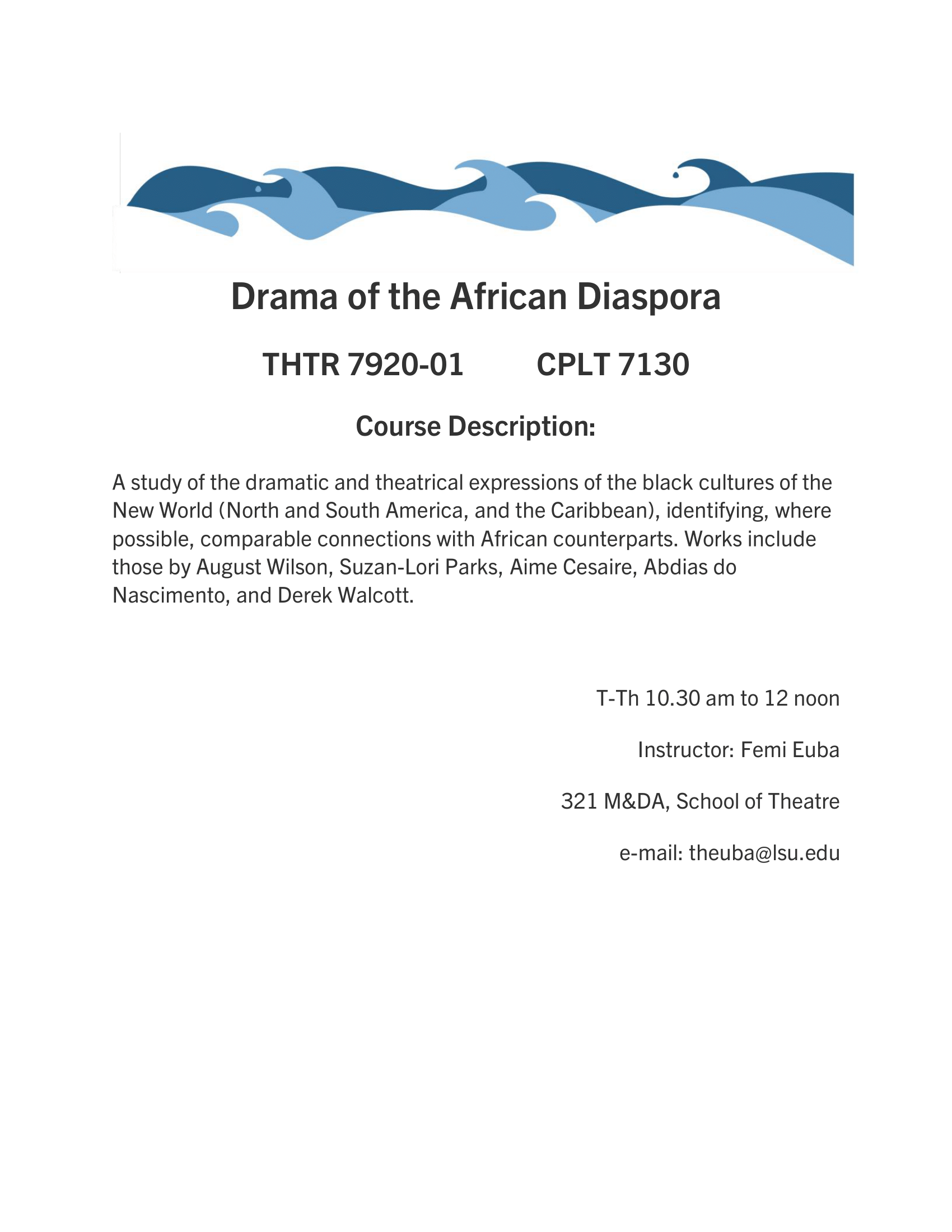
CPLT 7130/THTR 7920-01: Drama of the African Diaspora
Instructor: Femi Euba
Time: T-TH 10:30-12:00 p.m.
A study of the dramatic and theatrical expressions of the black cultures of the New World (North and South America, and the Caribbean), identifying, where possible, comparable connections with African counterparts. Works include those by August Wilson, Suzan-Lori Parks, Aime Cesaire, Abdias do Nascimento, and Derek Walcott.
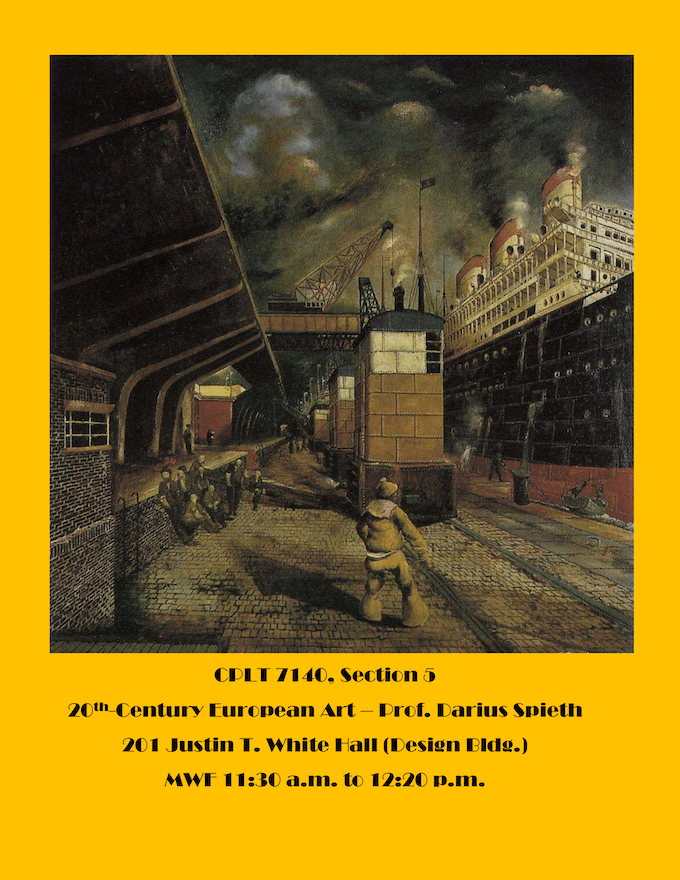
CPLT 7140 (Section 5): 20th-Century European Art
Instructor: Darius Spieth
Time: MWF 11:30-12:20 p.m.
This course surveys the development of twentieth-century European art through the end of the Cold War in the late 1980s. The first part of the course will retrace the evolution of various avant-garde movements until the outbreak of WWII. The second half will focus on the increasingly pluralistic art world that evolved in Europe since 1945 under the influence of American art movements and the post-war political environment. This course encourages you not only to get acquainted with the most important European twentieth-century artists and their works, but also to think about the relationship of the art presented with notions such as literary modernism, abstraction, the avant-garde, and postmodernism.
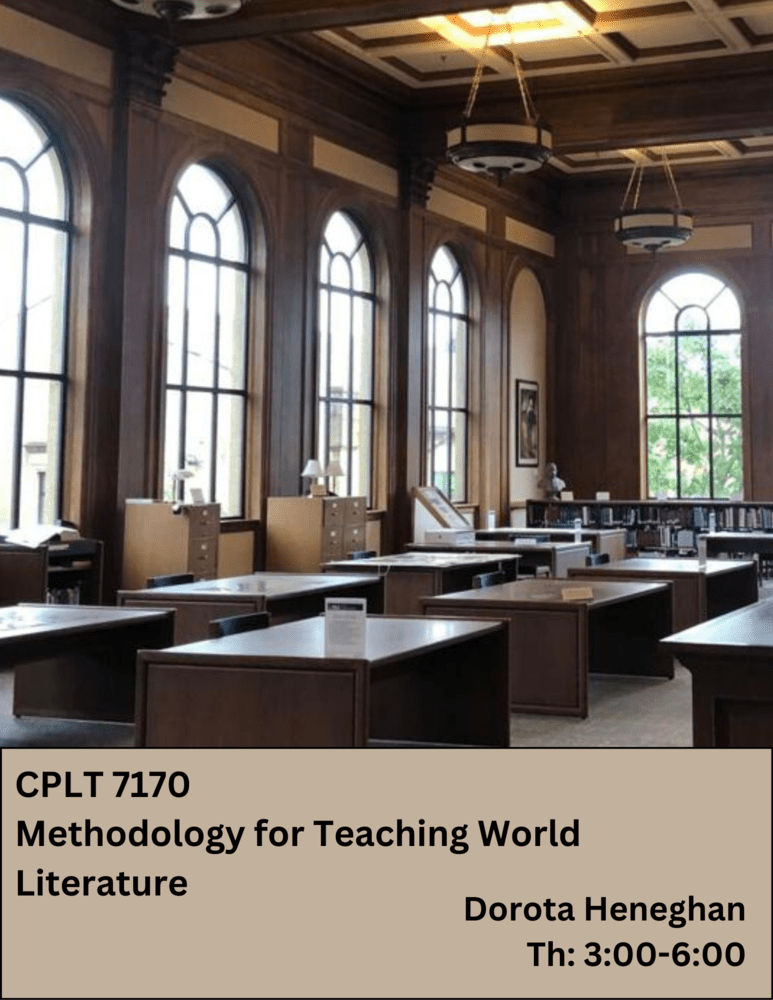 CPLT 7170: Methodology for Teaching World Literature
CPLT 7170: Methodology for Teaching World Literature
Instructor: Dorota Heneghan
Time: TH 3:00-6:00
The goal of this course is twofold: 1) introduce students to current and past debates about questions of method, purpose, and challenges to teach world literature 2) explore a set of pedagogical techniques to create syllabi related to the selected theme in a variety of texts and films spanning the chronological periods to which the current undergraduate courses: CPLT 2201/ ENGL 2201, CPLT 2202 / ENGL 2202 and CPLT 2203 / SCRN 2203 correspond. In addition to surveying comparative literature’s history and approaches to teaching world literature and global cinema, students will examine methods for using secondary sources for original interpretation and presentation of selected texts and films, selection and development of teaching materials, observations of classes and reflective self-assessment.
Undergraduate Courses
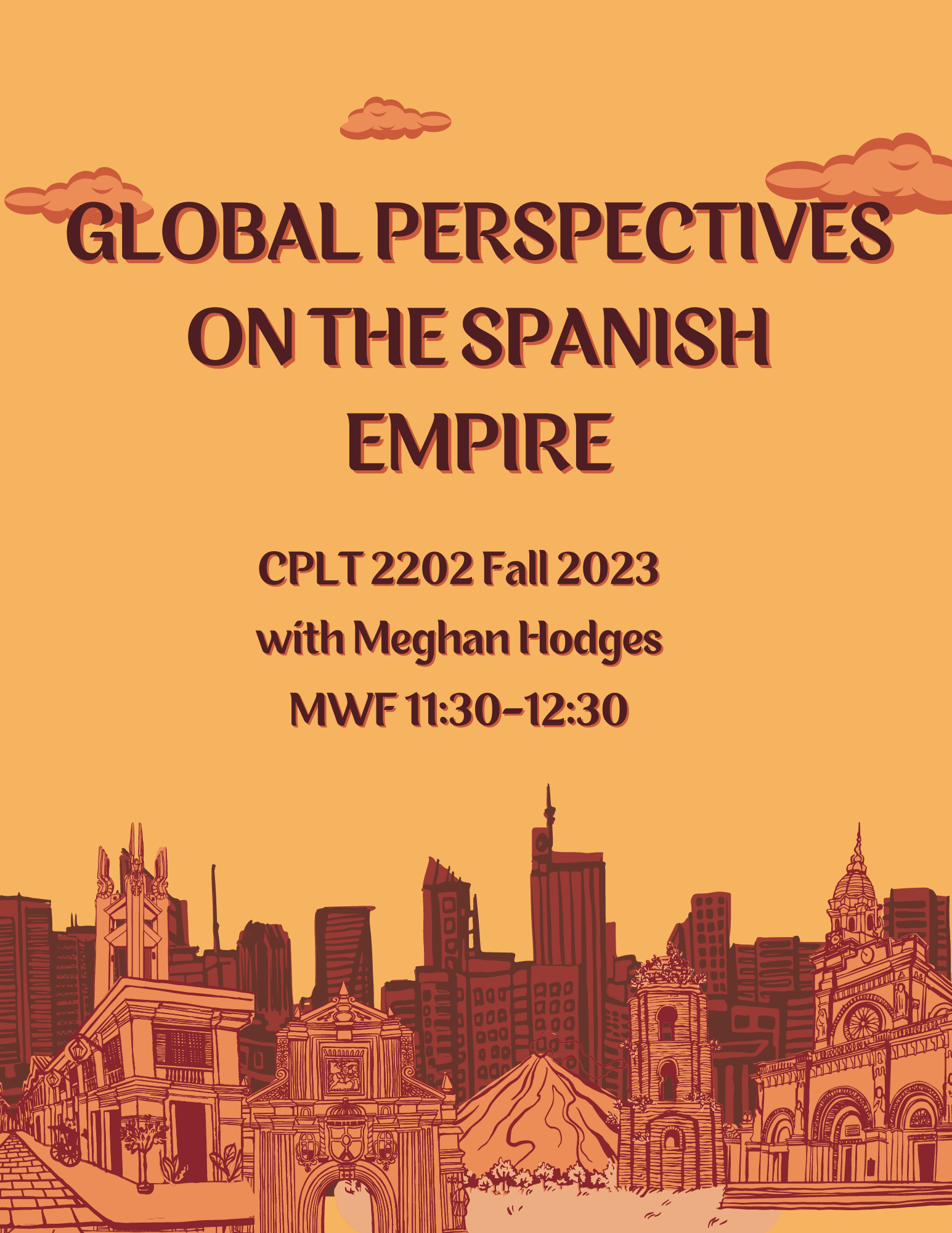
CPLT 2202: Global Perspectives on the Spanish Empire
Instructor: Meghan Hodges
Time: MWF 11:30-12:30 p.m.
Throughout this course, we will view and/or read a variety of texts from regions around the globe. Beginning with the Age of Exploration and ending with the colonial conflicts of the twentieth century, this course is designed to investigate the creation, flourishment, decline, and collapse of the Spanish Empire. We will make inquiry into the conditions of counter-colonial movements and peoples from colonized territories, Spain, and other nations who merely observed the collapse.
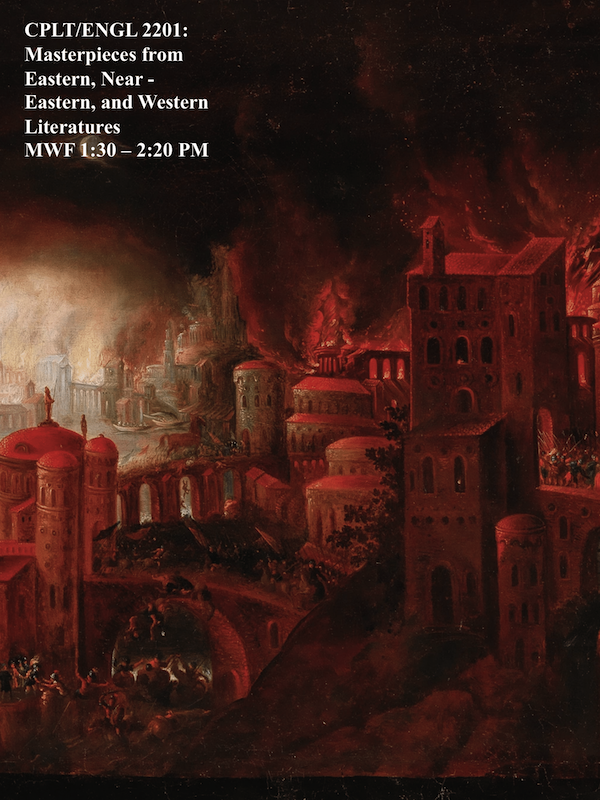
CPLT/ENG 2201: Masterpieces from Eastern, Near-Eastern, and Western Literatures
Instructor: Alexander Schmid
Time: MWF 1:30 - 2:20 p.m.
Join me on an epic quest through several masterpieces of Western and Near-Eastern Literature. This Fall, we will begin our exploration in the cradle of civilization with Gilgamesh and Enkidu. We will then proceed through Archaic Greece on an Odyssey with Homer to the isle of Lesbos to visit the poet Sappho. From those high seas, we will make the narrow crossing across the Ionian Sea to visit Rome, and there we will learn from Virgil's Aeneid the epic roots of the Roman Empire. From Rome, we will venture still west to the land of King Arthur, and there we will encounter the tale of Beowulf and the terrible Grendel. From the lonely island, we will voyage to Murasaki Shikibu’s 11th century Japan, and selections from her The Tale of Genji. We then sojourn back west to Syria, and there we will encounter Scheherazade and her Thousand and One Nights. We will conclude with short selections from four final masterpieces: Dante’s Divine Comedy, Christine de Pizan’s The Book of the City of Ladies, Chaucer’s The Knight’s Tale (from The Canterbury Tales), and John Milton’s Paradise Lost.
During our junket, we will be guided by the following overarching questions: (1) What makes a piece of literature a masterpiece? (2) How does a masterpiece relate to the genre of Epic in the ancient, medieval, and Early Modern worlds? (3) What does it mean for a work of literature to be a masterpiece of world literature? (4) How does the concept of world literature differ from a specific national literature, like Italian literature or Japanese literature? (5) What does it mean to read literature in translation?
Required Texts:
- Anonymous. The Epic of Gilgamesh: the Babylonian Epic Poem and Other Texts in Akkadian and Sumerian. Trans. Arthur George. Penguin Books, 2020. ISBN: 978-0140449198.
- Homer. The Odyssey of Homer. trans. Richmond Lattimore. Harper Perennial Modern Classics, 2007. ISBN: 978-0060904791.
- Virgil. The Aeneid of Virgil. Translated by Allen Mandelbaum, Bantam Classics; Revised Ed., 1981. ISBN: 978-0553210415.
- Anonymous. Beowulf. Trans. Seamus Heaney, 1st ed., W. W. Norton & Company, 2001. ISBN: 978-0393320978.
- Anonymous. The Book of the Thousand Nights and One Night. Translated by J.C. Mardrus and Powys Mathers, 1st ed., II, Routledge, 1990. ISBN: 978-0415045407.
- Milton, John. Paradise Lost. Edited by Gordon Teskey, 2nd ed., W. W. Norton & Company, 2020. ISBN: 978-0393617085.
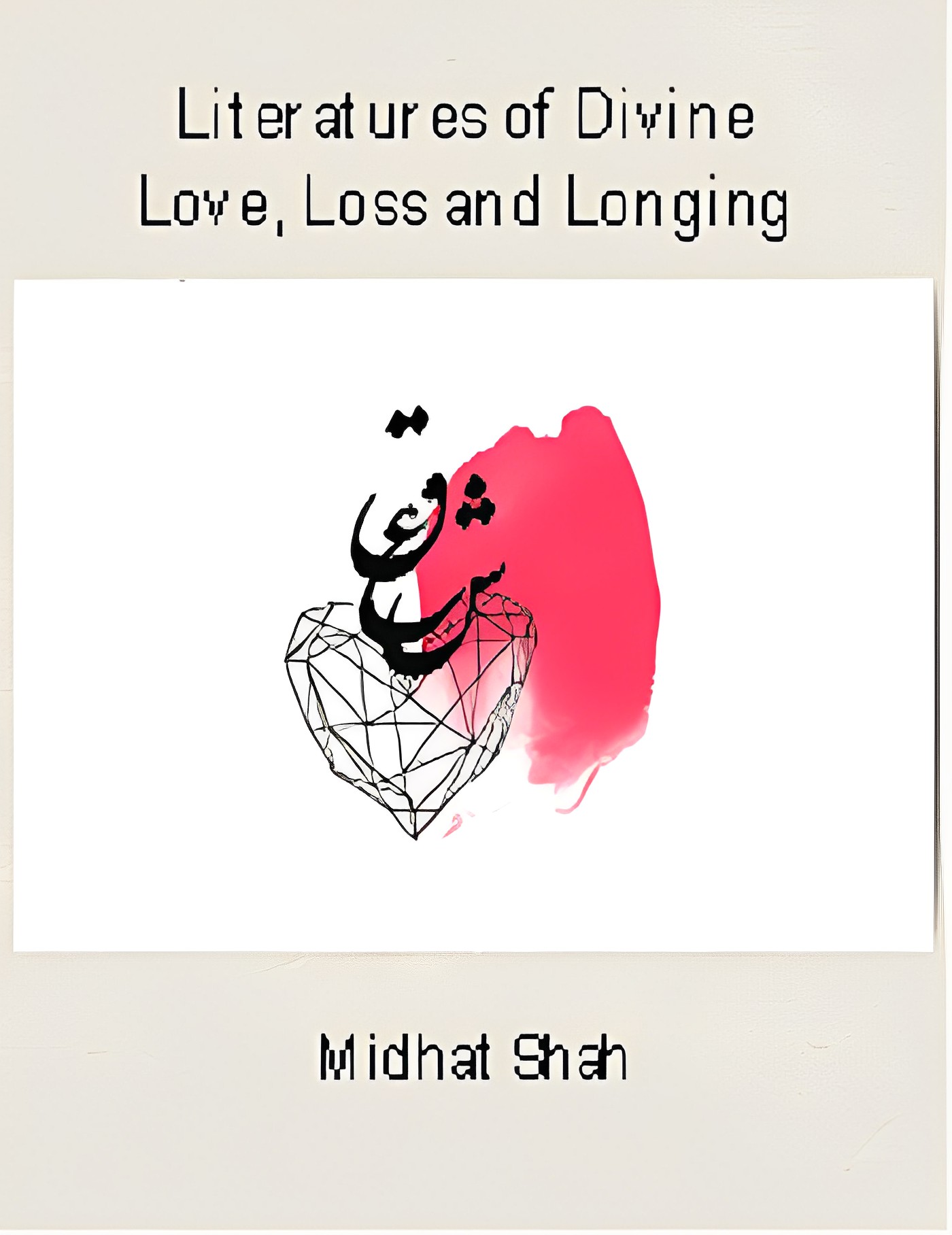 CPLT/ENGL 2201 (Section 2): Introduction to World Literary Traditions
CPLT/ENGL 2201 (Section 2): Introduction to World Literary Traditions
Instructor: Midhat Shah
Time: MWF 2:30-3:20 p.m.
Divine love or عشق is a motif that has influenced writers throughout the ages, from every culture to every tradition since the dawn of time. Themes of passion, devotion, displacement, separation, and self-discovery, along with spiritual quests, and immortality have blossomed into texts of unsurpassed depth and complexity. Whether it is an ancient heroic and romantic epic or didactic poetry, these writers have entertained, sustained and comforted audiences and readers through their aural, visual or textual reception of their works.
This module will examine a range of genres and forms and will provide students with insight into the motif and interpretation of divine love, loss, and longing by looking at a specific selection of texts in English translation (in poetry and prose) by different authors from across the regions of Africa, the Middle East, South and Southeast Asia and Europe, from Antiquity to Renaissance. This course will take us through the works of a variety of writers, ranging from Meister Eckhart to Maulana Rumi to Hadewijch to Mira to Lalla Dyad, interpreting and critically analyzing a wide range of texts and engaging with a variety of critical approaches when we read specific texts in their cultural, intercultural, and historical contexts.
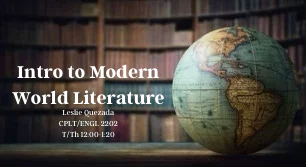
CPLT/ENGL 2202: Introduction to Modern World Literature
Instructor: Leslie Quezada
Time: T-TH 12-1:20 p.m.
This course focuses on representative works of modern and contemporary world literature by authors such as Chikamatsu Monzaemon, Henrik Ibsen, Sor Juana Ines de la Cruz, Frederick Douglass, and Wole Soyinka. From Journey to the West to The Metamorphosis, we will investigate representations of identity and culture, which will help guide our reading and analysis. We will begin our journey in the 14th century with early modern East Asian literature, traveling through places and time, ending with 21st century contemporary literature. The goal of this course is to introduce students to cultural diversity in a variety of literary traditions and genres, including novels, short-stories, film, poetry, and semi-autobiographical fiction. This course will also introduce foundational concepts and theories of world literature as an exciting field of study.